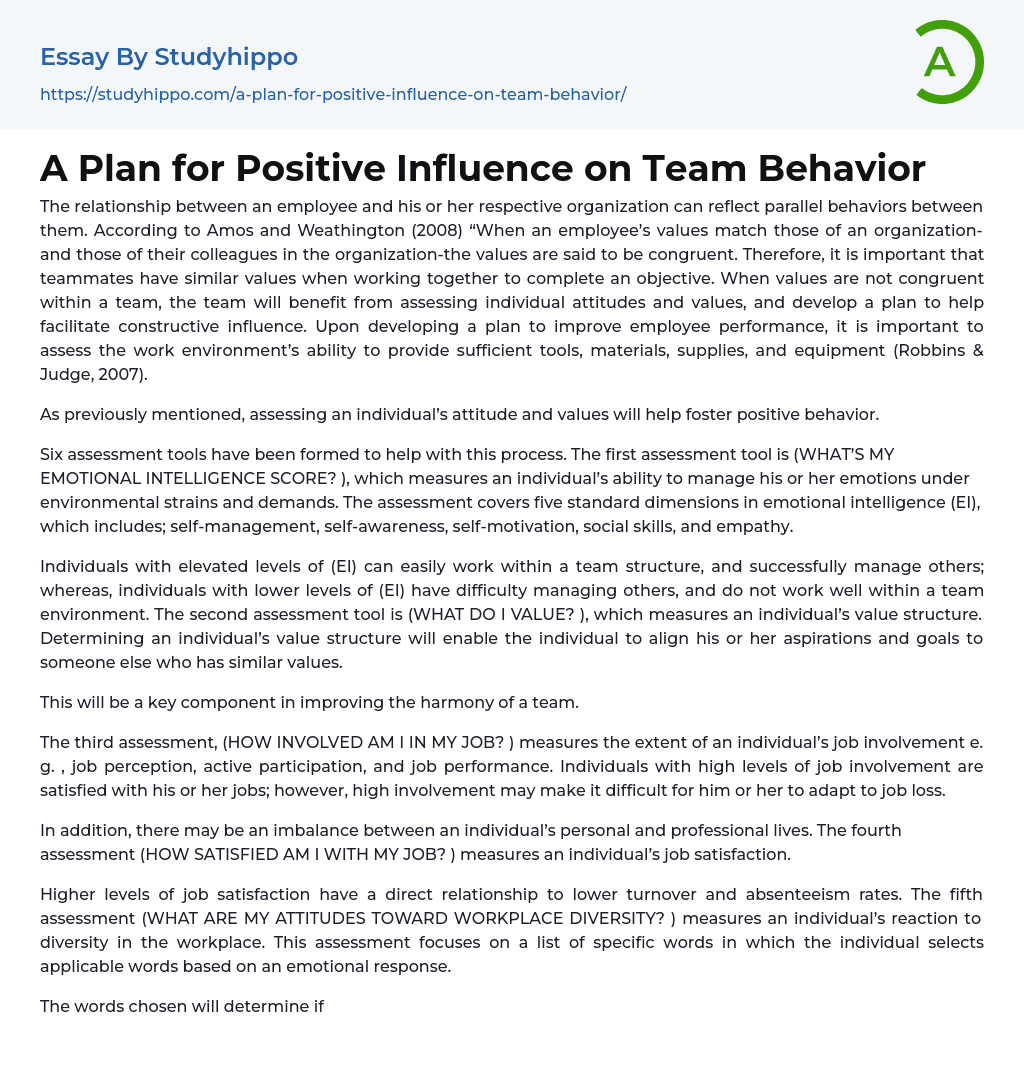

A Plan for Positive Influence on Team Behavior Essay Example
Amos and Weathington (2008) argue that congruent values between an employee and their organization can reflect similar behaviors between them. It is important for teammates to have similar values when completing objectives, as lack of congruence can be detrimental to team performance. To improve individual attitudes and values, it is necessary to develop a plan for constructive influence. Additionally, assessing the work environment's ability to provide sufficient tools and equipment is essential for improving employee performance (Robbins ; Judge, 2007).
To cultivate favorable conduct, it is beneficial to evaluate a person's mindset and principles, as stated beforehand.
High emotional intelligence (EI) enables people to lead effectively and work well in teams, while those lacking EI may struggle with managing others or functioning in a team. Another assessment tool is "What Do I Value?", which helps indivi
...duals match their aspirations and objectives with like-minded people by evaluating their value system.
The third evaluation known as "HOW INVOLVED AM I IN MY JOB?" assesses an individual's level of involvement in their job, including job perception, active participation, and job performance. Those who demonstrate a high degree of job involvement are typically satisfied with their job; however, this strong attachment may make it challenging for them to adjust to a job loss.
Lower turnover and absenteeism rates are directly related to higher levels of job satisfaction. The assessment titled "WHAT ARE MY ATTITUDES TOWARD WORKPLACE DIVERSITY?" measures an individual's emotional response to workplace diversity using a specific list of words.
Fig. 1 shows the DiSC, which is an assessment model consisting of four primary behavioral styles: dominance, interactive, steadiness, and cautious. The model evaluates an
individual based on these styles. Individuals with a dominant behavioral style are typically goal-oriented and enjoy being in control.
Individuals who possess a steady behavioral style are characterized as being unhurried, amicable, empathetic, and committed. They are also attentive and welcome diverse perspectives. These people are even-keeled and depend on factual information and statistics.
Understanding the personalities and actions of every member of a team is vital to boost the team's abilities and to facilitate efficient collaboration between the manager and the team.
Management can create a plan incorporating participative management, based on the assessment of employee (A) (Robbins ; Judge, 2007). Involving the employee in major decision making, such as determining well drilling amounts or placement of oil rigs, can increase their sense of importance within the team, improving both motivation and self-worth.
Management can provide assurance to Employee (B) that the Q3 financial results of the oil company are supported by statistical data. This will increase Employee (B)'s confidence in using the financial report and lead to satisfaction with the results. To aid Employee (C) in dealing with job-related stress, management can create an Employee Assistance Program. Additionally, Management can improve Employee (C)'s ability to create company presentations by providing sales and marketing education.
Integrating the above recommendations into the favorable impact strategy of the team will considerably enhance the team’s efficiency while ensuring the fulfillment of the organization's project. A workforce that collaborates effortlessly and feels at ease in their workplace elevates team spirit and preserves team unity. Utilizing the insights attained from assessment tools positively influences each team member and enables them to cooperate harmoniously, despite variations in attitude and behavior.
- Perseverance essays
- Expressive essays
- Character Traits essays
- Apology essays
- Compassion essays
- Adult essays
- Aggression essays
- Altruism essays
- Archetype essays
- Behavior essays
- Certainty essays
- Conformity essays
- Deception essays
- Human Behavior essays
- Human Sexuality essays
- Maturity essays
- Morality essays
- Obedience essays
- Procrastination essays
- Reinforcement essays
- Role Model essays
- Collective Bargaining essays
- Corporate Culture essays
- Hard Work essays
- Job Satisfaction essays
- Organizational Culture essays
- Organizational Structure essays
- Sweatshops essays
- Workforce essays
- Working capital essays
- Working Class essays
- Working Time essays
- Workstation essays
- Abnormal Psychology essays
- Abraham Maslow essays
- Attachment Theory essays
- Authority essays
- Behaviorism essays
- Classical Conditioning essays
- Cognitive Psychology essays
- Counseling essays
- Developmental Psychology essays
- Educational Psychology essays
- Erik Erikson essays
- Family Therapy essays
- Jean Piaget essays
- Maslow's Hierarchy Of Needs essays
- Mental Health essays
- Operant Conditioning essays
- Personality Psychology essays



